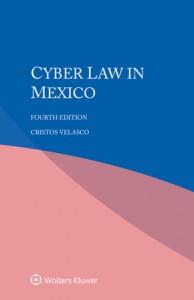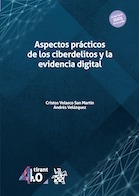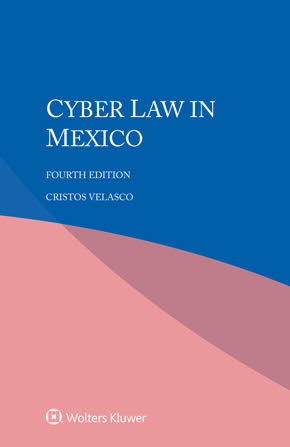 The fourth and most recent edition of my book “Cyber Law in Mexico” [ISBN-978-90-411-2188-2] has been published by Kluwer Law International. This book is part of the well-known “International Encyclopaedia for Cyber Law” coordinated by Jos Dumortier current Director of the boutique firm Timelex in Belgium and professor emeritus of the Catholic University of Leuven in Belgium.
The fourth and most recent edition of my book “Cyber Law in Mexico” [ISBN-978-90-411-2188-2] has been published by Kluwer Law International. This book is part of the well-known “International Encyclopaedia for Cyber Law” coordinated by Jos Dumortier current Director of the boutique firm Timelex in Belgium and professor emeritus of the Catholic University of Leuven in Belgium.
This book is available in electronic format or “print on demand” (printed format) directly with the publisher Kluwer Law International.
The fourth edition of this book contains a total of 472 pages and is updated until March 2019. This book is yet the only one specialized in the subject matter in Mexico and available in English.
This last edition contains a general introduction; statistics and background of the political system, population and geography; telecommunications infrastructure; statistics and current data on information technologies, broadband, competitiveness and investment in the telecommunications sector; electronic commerce; domain names; competitiveness and electronic government. The book is divided into ten main areas with different chapters and sub-subchapters and a final section of conclusions that includes an analysis on practical and legal aspects in the following areas:
I. Regulation of Information and Communication Technologies Market that consists of an analysis of the legal and regulatory framework of the telecommunications sector and includes a comprehensive review of the Federal Telecommunications and Broadcasting Law and the activities of the national regulatory agency IFT, and the telecommunications chapter of the new Trade Treaty between the United States, Mexico and Canada (USMCA); an analysis of the legal framework on competition of the telecommunications sector under the existing laws and trade agreements, activities and the most relevant fines established by the antitrust and competition agency Cofece and the judgements of the National Supreme Court of Justice on interconnection rates. This section includes a review of the current rules and regulations applicable to the standardization, certification and homologation of telecommunications equipment.
II. Protection of Intellectual Property in the ICT Sector includes an analysis and revision of the national rules applicable to copyright in the field of Information and Communication Technologies, including international treaties of which Mexico is a party to, the applicable law to the protection of software, databases, computer chips, trademark licenses and licensing schemes; the current legal framework applicable to the registration of domain names, including an analysis of domain name disputes currently managed under WIPO’s domain names dispute resolution system, among other relevant issues.
III. ICT Contracts incorporates an analysis of the legal framework applicable to software license contracts, government contracts and contracts related to electronic transactions.
IV. Electronic Transactions contains an analysis of the applicable rules for the acceptance and entering of electronic contracts, the regulation of electronic commerce, data messages and obligations of preservation in the commercial sphere; a detailed review of the applicable legal framework of electronic signatures and certification service providers, including the legislation on advanced electronic signatures in the following sectors: trade, consumer, financial & banking, tax and administrative; a review of the rules regarding the preservation of data messages and digitalization of documents, the provisions on applicable law and jurisdiction for consumers, the applicable framework to unsolicited communications (spam) and marketing practices; a review of the current status of national digital identity cards, statistics on online banking and a new chapter that contains a summary of the applicable regulations to entities of the FinTech sector and the various modalities and entities of the financial sector regulated in Mexico.
V. Non-Contractual Liability incorporates an analysis of the rules on tort, negligence, damages and liability of network operators and Internet service providers.
VI. Online Legal Proceedings includes an analysis of the legal and administrative framework of online judicial procedures, in particular regarding the national online justice system and the sanctions imposed by the Federal Court of Tax and Administrative Justice.
VII. Privacy and Data Protection includes an analysis of the national constitutional reforms on privacy and data protection, provisions on data protection contained in international treaties of which Mexico is a party to, federal and state legislation on the protection of personal data, which includes a detailed review of the Federal Law for the Protection of Personal Data Held by Private Parties (LFPDPPP) and its Regulation, as well as each instrument, recommendation and guidelines on data protection issued by the national data protection authority INAI; the most relevant fines and sanctions against data controllers and data processors established by the INAI; the self-regulatory standards and schemes in the field of data protection established by the INAI, an analysis of the jurisprudence and cases on privacy and data protection resolved by the National Supreme Court of Justice and the Federal Courts, studies of the Internet industry and national statistics on protection of personal data, investigations and cases related to the “right to be forgotten” resolved by the INAI, an analysis of the provisions applicable to data protection in the health sector, passenger name records, the investigation launched by INAI against Cambridge Analytica, the investigation concerning the nominal list of the National Electoral Registry found in Amazon cloud storage services. This section also includes an exhaustive analysis of the General Law for the Protection of Personal Data in Possession of Obligated Subjects that regulates all entities and institutions of the public government sector, including the principles, duties and responsibilities established in said law.
VIII. Transparency and Access to Government Information includes an analysis of the constitutional reforms concerning access to information and the applicable and current legal framework, which includes an analysis of the Federal Law of Transparency and Access to Public Information (LFTAIP) and the General Law of Transparency and Access to Public Information (LGTAIP), the applicable framework on data protection, information on the national platform for transparency and access to information available for citizens to make requests for access to information and relevant statistics on access to information requests from the national authority INAI.
IX. Computer and Internet related Crime consists of an analysis of the substantive provisions of the Federal Criminal Code regarding crimes committed through information and communication technologies, including the reform of June 2018 that criminalizes the conduct of ‘grooming’. This chapter also contains an analysis of the provisions related to the interception of private communications, the geographical location of mobile equipment and systems by the law enforcement authorities and cooperation in criminal investigations, crimes related to computer systems, crimes related to copyright, crimes against the security of the nation, use and recognition of electronic evidence in criminal investigations under the National Code of Criminal Proceedings; the applicable substantive and procedural norms to criminal jurisdiction, draft law initiatives on cybercrime, activities related to international cooperation and national statistics on cybercrimes; analysis of state legislation, investigation and prosecution of computer crimes by national law enforcement authorities, including the powers of the Cybercrime Investigation and Operations Unit of the Federal Investigation Agency and the Unit for the Intervention of Private Communications of the Federal Police and cooperation between investigative authorities and Internet service providers. This section includes a new chapter on Cybersecurity that contains an analysis of the national strategy on cybersecurity of the federal government, the applicable legislation and regulation to cybersecurity in the federal sphere, the activities of the CERT-MX of the Scientific Division of the Federal Police, activities to raise awareness on cybersecurity and a synthesis of the cyberattack targeted to the electronic payment system of the Bank of Mexico and the affected financial institutions. Likewise, this part includes a section on Government Surveillance that analyzes the case brought by R3D before the former Office of the Attorney General (PGR) related to the surveillance of journalists and human rights activists through software PEGASUS and the proceedings and investigation initiated by the data protection agency INAI.
This book contains a final section of conclusions and recommendations addressed to the various stakeholders that collaborate in the development and promotion of the use of information and Internet technologies whose purpose is to support Mexico to conduct and promote necessary legislative reforms and implementation of public policies so that pending tasks are adequately regulated in the national legislative agenda.
Special thanks to Andres Velazquez (@cibercrimen), Director of MaTTica for having drafted the Prologue for this edition. I will be presenting this book in conferences and seminars related to the regulation of ICTs, as well as in some Universities and academic circles in Mexico, Latin America and in Europe during 2019.
The book may be purchased directly in the website of Kluwer Law International. Please note that there are other vendors (including Amazon) that offer the book, but it is very likely that they are previous editions. The Flyer of the book may be downloaded here
#Activosvirtuales #Blockchain #BudapestConvention #CambridgeAnalytica #Cibercrimen #Ciberdelitos #Ciberseguridad #CloudAct #Cloudcomputing #Cyber #Cybercrime #Cyberattacks #Cybersecurity #Convention108 #Criptomonedas #Cryptocurrencies #Datospersonales #DerechoalOlvido #E-Evidence #Fintech #IoT #LeyFintech #IA #Privacidad #RighttobeForgotten #WHOIS









Leave a Reply